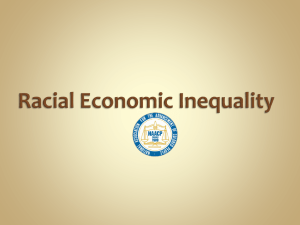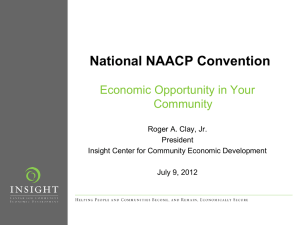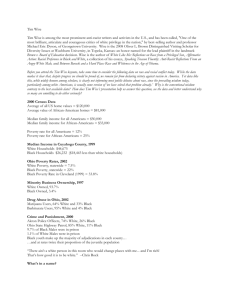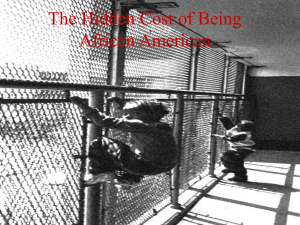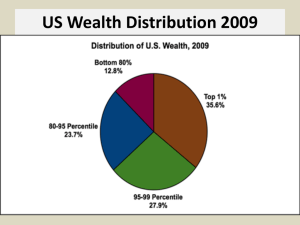All Questions No Names
advertisement
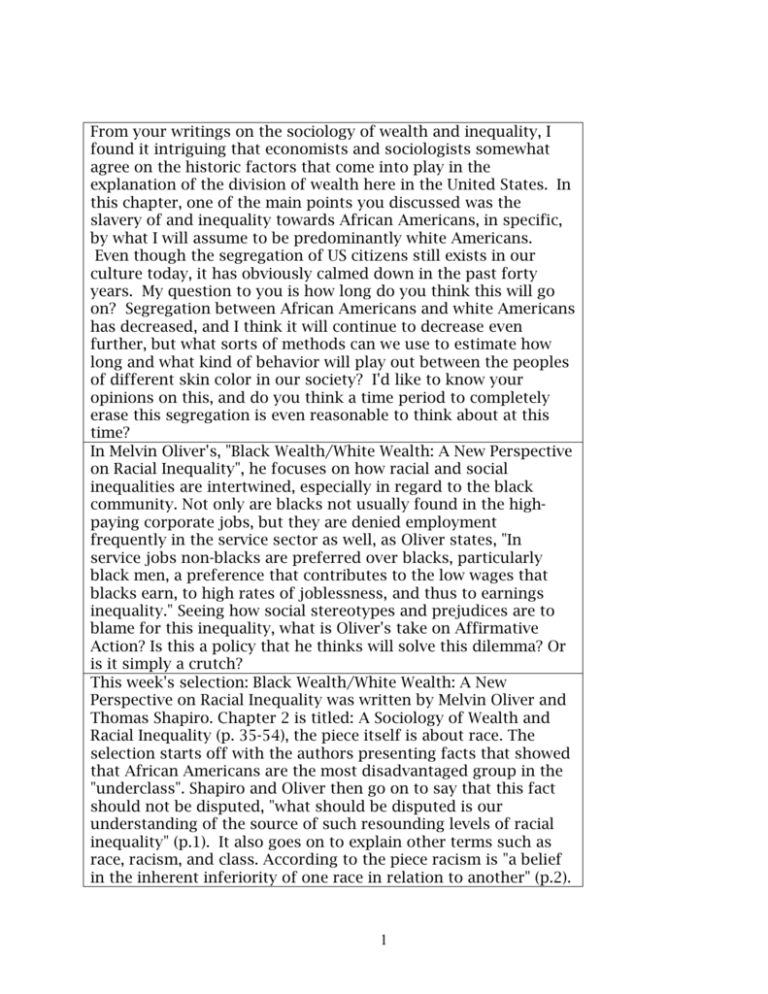
From your writings on the sociology of wealth and inequality, I found it intriguing that economists and sociologists somewhat agree on the historic factors that come into play in the explanation of the division of wealth here in the United States. In this chapter, one of the main points you discussed was the slavery of and inequality towards African Americans, in specific, by what I will assume to be predominantly white Americans. Even though the segregation of US citizens still exists in our culture today, it has obviously calmed down in the past forty years. My question to you is how long do you think this will go on? Segregation between African Americans and white Americans has decreased, and I think it will continue to decrease even further, but what sorts of methods can we use to estimate how long and what kind of behavior will play out between the peoples of different skin color in our society? I'd like to know your opinions on this, and do you think a time period to completely erase this segregation is even reasonable to think about at this time? In Melvin Oliver's, "Black Wealth/White Wealth: A New Perspective on Racial Inequality", he focuses on how racial and social inequalities are intertwined, especially in regard to the black community. Not only are blacks not usually found in the highpaying corporate jobs, but they are denied employment frequently in the service sector as well, as Oliver states, "In service jobs non-blacks are preferred over blacks, particularly black men, a preference that contributes to the low wages that blacks earn, to high rates of joblessness, and thus to earnings inequality." Seeing how social stereotypes and prejudices are to blame for this inequality, what is Oliver's take on Affirmative Action? Is this a policy that he thinks will solve this dilemma? Or is it simply a crutch? This week's selection: Black Wealth/White Wealth: A New Perspective on Racial Inequality was written by Melvin Oliver and Thomas Shapiro. Chapter 2 is titled: A Sociology of Wealth and Racial Inequality (p. 35-54), the piece itself is about race. The selection starts off with the authors presenting facts that showed that African Americans are the most disadvantaged group in the "underclass". Shapiro and Oliver then go on to say that this fact should not be disputed, "what should be disputed is our understanding of the source of such resounding levels of racial inequality" (p.1). It also goes on to explain other terms such as race, racism, and class. According to the piece racism is "a belief in the inherent inferiority of one race in relation to another" (p.2). 1 My first question is: what really defines racism? Is it that you think a race is inferior to yours or that your race is better than another or both? And if you have stereotypes about certain races does that make you a racist? And also, as a Hispanic, I have heard many times how minorities complain about how it's the "white's people fault" and how "there's nothing we can do to better our situation' and that "the system messes us up". Do you really think this is true? And finally, why is it so hard to break class or race barriers? In A Sociology of Wealth and Racial Inequality, Oliver discusses the racial inequality between blacks and whites, and claims that human capital deficiencies are a major factor. Oliver goes into detail about the racialization of the state and how its legislation also affects the inequality of blacks and whites. It was stated that when a neighborhood becomes over 20% black, whites flee from the neighborhoods, and, as a result, the value of the neighborhood declines. Is this historically accurate? Does this always happen, or does it just happen once in a while? After reading the article, "A Sociology of Wealth and Racial Equality," I noticed that Melvin Oliver discusses how many of the government programs and policies have increased much of the racial and economic inequality and I would like to ask if he feels if there are any policies right now that are having a strong impact on inequality and does he believe it is possible to have true equality, because I personally feel that as long as money exists, there will never be equality and equal opportunity. When reading the Omi and Winant article, Racial Formation in the U.S?,? and about the Susue Guillory Phipps case, I started to think about our society?s obsession with classification. It seems that nearly every legal form you fill out, or even just a survey for a class project, includes first and foremost an area to mark your gender and race. My high school was very diverse and many people such as Pacific Islanders or Middle Easterners would complain that their race was not provided as a choice on college applications and other forms. I understand that this information is necessary for governmental censuses and other data but I feel that too much significance is placed on the grouping of people. When applying to college for instance, the box you check may have huge implications in terms of your acceptance to various schools. In chapter two of Oliver and Shapiro?s ?Black Wealth/ White Wealth: A New Perspective on Racial Inequality,? the authors raise the theory that perhaps in modern times America is not so much 2 racist as it is classist with the statistic that unfair wages are tied more closely to economic class than to race. I feel that there is much truth behind this because in general, I feel that the upper echelon tends to stereotype and disrespect the poor as a group rather than one race in particular. The race of the impoverished is discriminated against in our culture and assumptions are made about the character of these people (they must be lazy and unintelligent, etc.). In the reading from chapter eight, the authors discuss financial inequality. Although these statistics have come up many times recently, the fact that wealthiest 5% of Americans hold over 67% of the country?s capital and that the poorest 40% of the country controls only 1% of the financial wealth still shocks me. Considering the common American ideal of equality, it is interesting that the nation is very unequal in terms of finances. It is so unfortunate that some families are forced to turn to subprime lending in order to gain home ownership while these groups see them as nothing more than an easy target for financial gain. Question for the guest lecturer(s): Do you think that racial inequality is something that will gradually diminish naturally, or do you think that it will remain inextricably tied to class inequality, an element that will inevitably be present in a capitalist society such as ours? The readings for this week's guest can be summed in two phrases: Black/ White inequality, and inequality in homeownership. He argues mainly that our society is inadvertently racist, and that our policies favor those already on the top of the social spectrum at the expense of everyone else. A great example of this is home ownership in America. The primary way to build wealth is to buy a home, but minorities who need to build wealth the most often have the most trouble getting financing to buy a home. Question: There is evidently a disparity in how regulations around home financing and federal aid favor whites or blacks. What we can do, in terms of national policy, to help more people get into their first home, no matter their race? So within Oliver’s first piece the most interesting thing, that I am very glad he brought up, are the issues surrounding welfare. I am so glad he brought up the fact that welfare was originally intended for white, female widows of WWII to support their families. The fact that this ideal recipient somehow shifted to 3 create a dehumanization of the people who receive aid now is almost unfathomable to me. I think that you definitely have to look to racist thought as to why “welfare” changed from this wonderful and glorified program to something that attacks the disproportionate amount of women of color who use aid now. Not to mention the fact that aid for children is not all that accessible for women in lower income/inner cities, which is where most aid goes and is majority women of color. This aid is not applicable for several reasons the one I find most problematic is the child cap and the stipulations of where the aid money can be used. What I mean by this is: there is a maximum number of children women can have (not sure of the number) before they lose their aid money. However, this aid money can not be used for contraceptives (I believe) which are constantly on the rise monetarily and go against religious views that many women of color participate in. They money also cannot be used, and this is definite no exception, for any abortion. This money can be used though for permanent sterilization. The fact that these women can be permanently, and I would argue forcefully, sterilized but the government will not pay for an abortion even in states where it is legal, is criminal. They are forcing a choice on these people to either choose family or money. This is only one of the many ways, that women of color and low income women are targeted with this thing called “aid”. My questions is that when they were doing an overview they tried to break down race and class separately, yet ended up bringing race into the class discussion. Do you feel that these two factors can be separated completely and effectively? (Because I do not). I did not understand how the FHA favored lending to whites over blacks. Some clarification of this would be useful. #1 Do you feel that the money in Obama's stimulus package is going to the American's that need it the most? Furthermore, do you feel that the money in Obama's stimulus package is going to the American's that will use the money to ACTUALLY stimulate the economy? Q#2 How necessary has welfare been over the past decade (mainly before the current economic crisis)? Has welfare been a drain on the economy because it's reverse effect for many Americans or has welfare been an overall success in stimulating lower class households and communities? in the article "A sociology of wealth and inequality" I would personally love to elaborate on all the "plot holes" mentioned. I am half German and half Asian so I feel, knowing my parent's past, I have the right to distinguish inequalities brought by 4 cultures themselves versus inequalities deemed by society by personally seeing them from country to country. I always have a problem with self victimizing citizens because I feel it is brought down by their own cultures by themselves so it just makes me enraged to ever hear talk about racial inequalities, what I want to ask Oliver is the specific difference between the opportunities in the ghetto versus those in wealthy neighborhoods of the same race and how and why it will effect their future. In this weeks readings, the story of Susie Guillory Phipps introduced the subject of race and how it is constructed in the United States as well as how important it is in everyday life. Susie Guillory Phipps was a hypo-descendent, which refers to having some percentage of non-white ancestry even if you may look like a normal white person. She tried to change her racial classification from black to white but could not because under Louisiana state law you were considered black if you had at least 1/32nd Negro blood. So what is the big deal about being classified as black or white on your birth certificate? Based on the principles of racial formation, being considered black in America basically assumes that you have a disadvantage in every single aspect of life. We pride ourselves on being a free nation but we still live in a system that discriminates anybody who is “nonwhite.” Over the years of the forming and maturation of America, race has been interpreted in different ways and has had different meanings to different people. If America was not founded by Northern European settlers would we have a different view of race today? Would the country be the world power that it is today? Would it be possible that some other “non-white” race would be the dominant race and being white would be just like being black in modern America? My question to Professor Melvin Oliver is how long have you spent researching these negative effects on blacks and how did you first become interested in studying the economic disabilities blacks are faced with just for the sheer fact that they are racially classified as black? If this is so much the case, as I agree that racism is a hard issue to prove, more or less find evidence for, then how do you suggest that the issues of racial inequality in positions of power as well as in policy be handled? How do you propose we bring justice and equality to this white privilege system? History plays a huge role in determining how we've gotten to where we are. If our racist history as a country has placed blacks in the position they are in today, in which they cannot pull themselves up by their bootstraps as Horatio Alger would argue, then we must change the system. African-Americans find 5 themselves stuck in a never-ending cycle of poverty because of their class struggle and racist hiring practices. Is there any way to change this without involving the federal and state governments on a large scale? Can free market capitalism solve the racial problem? I am very intrigued about your ideas on both perspectives on class and race ideologies. Both class and race are indeed counterproductive because racism focus on selective groups and the inequalities they receive from another group, and, class focus on the amount of opportunity and access that an individual was born into. I see your views and I get the impression that you are saying that the race-based ideals are individual perspectives and class are institutional. I get these two perspectives and I agree that you cannot use one over the other. Both, in a sense, contradict each other. I totally agree with your ideals of both racism and class being a social construction. But as both are stated as being a social construction does that means that the views and the relationship between class and race perspectives differ in other countries, nations, factories? If so do you feel that the relationship between class and race are affected by the values that different societies uphold? in what way is the understanding of the source of racial inequality disputed when the economic statuses of each race so clearly defined? The examples Oliver presents shows how the rich people of America are only getting more rich, while the poor people are slowly declining. There is a large gap between the families of the United States. My question to you professor Oliver is, how can we minimize this financial gap between the rich and the poor ? Melvin Oliver and Thomas Shapiro analyze wealth, total assets and debts rather than income alone to uncover deep and relentless racial inequality in America, and they show how public policies fail to equalize the problem. An examination of how assets are created, expanded and preserved reveals a deep economic divide between blacks and whites. By doing interviews and comparisons between white families and black families the racial face of wealth in America is measured and conceptualized. “The rise of the black middle class is heralded as evidence of greater racial equality”, but why do middle-class blacks possess only fifteen cents for every dollar of wealth held by middle-class whites? Why do 61% of black households have no financial assets at all - twice the rate for white households? African Americans have been oppressed for years by these situations. In the article it is said that this occurs because of past history and it is pasted from generation to generation. Do you believe that this train 6 reaction, keeping minorities oppressed, will ever stop? Racial integration and inequalities have for a long time been ingrained in our culture. Because of the past, many african americans are trapped in bad neighborhoods without good education and help from the government. This leads to higher crime rates and often more drugs/alcohol problems in the community. Historically, blacks have had fewer or no rights, made less money, and had worse job, which has left them at an economic disadvantage with few hopes of rising up. Even now, racial inequality is common and holds people down. People have biases based on the past that they cannot get over. What are some ways to bridge the gap between old ideas and values and the modern world we live in, so that people will change their predjudices. Is there some way that awareness could be raised and this could be changed? Will having an black president help this in any way? Do you feel that racism is increasing or decreasing on a global scale? Is the World becoming more or less racist? The examples of racism in the US that you have presented in your story only strengthen the appeal for a ban on racism. It is absurd for someone to have 31 white ancestors and then 1 black ancestor, however their governing body still labels them as “black”. What are some initial steps that need to be taken so that these kinds of instances do not define the country that we are striving to become? How can one country such as brazil have many different races and be fine with it, where as the US, a global power, feels they have to label everyone so that they know their place in society? In this article, “A Sociology of Wealth and Racial Inequality,” racism is addressed as an institutionally derived concept. Yet while America as an institution has openly and dramatically shifted from condoning to condemning this ideology, racism survives in the minds of many individuals though often subconsciously. To what degree does the presence of these underlying preconceptions determine the inequality in such areas discussed in this article? How much power does the unspoken sentiment of individuals hold over the behavior of a collective institution? The trends of wealth in today?s society vary from the class distinction of blacks and whites to issues pertaining to the cumulative effects of history on the black community. Oliver argues that blacks and whites are at different economic hierarchies because blacks did not have the same opportunity structure as the whites. ?It has been the different ?opportunity 7 structure? for savings and investment that African Americans have faced when compared with whites that has helped to structure racial inequality in wealth holding.? [Oliver 207] Three concepts were developed to ground his approach to understand the racial wealth gap and highlight wealth inequalities. The first of which is racialization of state policy and how the state impaired blacks to accumulate wealth from the days of slavery and at other points in history due to discrimination. The second of which is the ?economic detour? which lowered the level of successful entrepreneurship of black Americans. The third is sedimentation of racial inequality and how the cumulative effects of history cemented blacks to the bottom of the economic hierarchy. Although I do agree with many of Oliver?s claims and reasoning for this issue, I must ask which racial policies are still hindering black Americans today? What are some primary factors today that reflect the low level of black entrepreneurship and what would be a solution? I agree with the point on how the sedimentation of racial inequality has placed blacks at the bottom of the hierarchical list. What would be a solution that you might have to reverse the effects of the sedimentation and give blacks the ability to improve their stance in the economic hierarchy? What do you believe would be a solution to the ?economic detour?? Do you believe if more blacks were given the opportunity to prevail in entrepreneurship the economic hierarchy of blacks would increase? From the Oliver and Shapiro reading the main reason for inequality in America has been American policies. The richer are getting richer and the poor are suffering, since the economy is falling apart. The fact that black and whites are so separated in wealth supposedly has everything to do with the past and what opportunities they were given. As Alger would say people can come up from nothing and create something out of themselves. I have a hard time believing that american policy is still keeping keeping in their social classes. So how in the long run are we going to solve the ever lasting question of American wealth adn inequality? One of the biggest issues in the American history is slavery. Oliver and Shapiro theorize that this past economic struggle among African Americans has a high impact on their daily lives today. Within their article, Oliver and Shapiro focused on state policy and how it deliberately upholds the sediments of this history in act. They argue: “State policy has racialized the opportunities for the development 8 of wealth, creating and sustaining the existing patterns of wealth inequality and extending them into the future.” (pg 47) I agree to an extent the irony behind some of the state policy goals. Instead of reducing the economic scarcity and poverty, a program like AFDC actually helps it. However, I would have to disagree if the state policy has indeed managed to “racialize” its own purposes. We have to stretch the racial spectrum when it comes to determining people who receive aid from the government. Just because the black race has a much higher concentration of people receiving the aid doesn’t mean that they are the ones being targeted by the state policy. Latinos, Asians, and other immigrants of the United States under any bad economic circumstance, are also trapped under the AFDC program. As I’m sure they all must find their way out in order to live more comfortably. I speak on the behalf of my single mother who used to receive aid from the AFDC program, and little by little did she manage to become a business owner of a Nursing Home for the Mentally Disabled. Coming to America with little to no budget was a big disadvantage on her part, yet it didn’t stop her from fulfilling her dreams and aspirations. With that, shouldn’t there be a better reason why the African American race is in an economic struggle besides the nuisance of state policy? What seems clear after reading the chapters is that there is a belief that state policy has caused African Americans to live the way they do and to be disadvantaged since the time of slavery. With a newly elected government, and with the head of that government being black, what, if any policies do you feel Obama will promote or change in order to equalize wealth? Do you feel that merely having a black president will change the morale of the black community in feeling more equal with races that they may feel are ?higher? than them? In essence, how do you feel the new government will change the situation of blacks in America? In chapter 2 of your book, you introduce the idea of racism and its relationship to wealth, class, and opportunistic inequalities. However, the root of racism is not clear, would u say that racism was created by the individual and expressed through institutions or created by institutions and expressed through the individual? And, although Blacks and Whites are not the only two racial groups in America, you only seem to focus on these two. Is this because they are the two most significantly distanced groups with regards to wealth inequality? Does this mean that most other racial groups such as Hispanics and Asians fall somewhere in between Whites and Blacks? Or is it because these two groups were the outline of high and low groups in the earlier years of 9 modern America, with respects to slavery? I also noticed that most of the despairities that you pointed out occured at the height of racism in America. Now that these levels of racism have decreased, do you still think there is such a gap between the wealth of Whites and Blacks? If so, how do you explain the success rates of current day African American entrepreneurs, politicians, and entertainers? ThThis week's readings focused on the inequality in social status which consequently explains the cleavage between the wealth among white Americans and black Americans. Factors such as slavery and racism, as well as having little human capital and historically discriminating economic practices led the inequalities seen today. All this taken into consideration plus other factors that the readings discussed (don't want to summarize too much) it seems like the African American people as a whole cannot get out of their present opportunity pools because of the long history of these social and economic factors. How can an African American child expect to do well in such a competitive world if their school is inferior, they only have their mother to financially and mentally support their upbringing, and their living conditions are riddled with drug dealers, decrepit housing, and gangsterthugs? Despite slavery ending 200 years ago and the implementation of the a anti discriminatory laws and acts like the Civil Rights Act of 1964, progress has not jumped leaps and bounds as it perhaps was expected to. Why is this? Perhaps, as the readings imply, that the culture as a whole is to blame. Discounting blatant racism, is the everyday white man really racist? Is it a subconscious thing and if so, then how can this be changed? Are white Americans conditioned to be discriminatory? If this is the reason then how long will it take for results to be visible? And if this subconscious notion is not the cause of this discrimination, than what is? In their book Black Wealth/White Wealth: A New Perspective on Racial Inequality, Melvin Oliver and Thomas Shapiro discuss the issues of wealth and inequality in relation to race. These readings are concerning because they make me wonder how our country could have allowed itself to come to a point where it has such drastic inequalities. In the first section of reading, Oliver and Shapiro say that, when attempting to understand racial inequality, it is important that both race and class be taken into consideration, rather than just one or the other. They explain that a major reason for which black and whites are not accumulating the same amount of wealth is because they are not given the same investment opportunities. They go on to discuss policies that were created by the state that have created some inequality 10 in opportunities between blacks and whites (such as slavery and the FHA), as well as the reasons for which black self-employment has been unsuccessful. In the second part of the reading, Oliver and Shapiro discuss the inequality in differences in pay. They say that ?the wealthy were the biggest beneficiaries of tax policies during President Bush?s first term.? I guess what I am confused about is the logic behind Bush?s decision to give tax breaks to the very wealthy. What good does it do when those who are struggling to put food on the table and have a roof over their head have to pay taxes, while those with the most money in the country are getting tax cuts? Do you think that if the tax breaks were given to the poor instead, the inequality between blacks and whites in terms of wealth would decrease? Dean Oliver, in your book Black Wealth/White Wealth: A New Perspective on Racial Inequality you talk about how many government institutions such as the AFDC and IRS implement policies effectively preserving the poverty of blacks. I can understand that since the end of slavery it has been hard for blacks to fight against such seemingly subtle institutionalized racism, but after the great strides made during the Civil Rights Movement I do not see how these policies have not been amended. Caught in a Catch-22 where wealth is a prerequisite to make more wealth, and those without money cannot make any, blacks in poverty are now not segregated racially outright, but instead subtly segregated economically. Though race and class have become intertwined for low-income blacks, which would you say has more bearing on their socioeconomic status and why? Also, why haven't more measures been taken to reveal these oppressive social and economic measures that keep blacks segregated economically and prevent them from gaining wealth? I thought your comment on the New Deal legislation excluding African Americans and Latinos was interesting since Americans tend to look back at the New Deal as the first time the administration took a proactive stance in pulling people out of impoverished conditions. According to your article, it was exactly the opposite. What kind of parallels would you draw with recent administrations (Bush or Clinton) in which programs that have been implemented to decrease inequality have actually contributed to it strongly but indirectly? Also, would you characterize current racial and class inequality as mostly a result of individual factors in certain places or universal factors that apply throughout the country? Dean Oliver, you argue that after the New Deal was implemented, African Americans suffered because of the state policies it 11 enforced, namely the Social Security Act. You say that blacks were given a disadvantage because low income workers were neglected and because blacks tended to be taxed on a much higher percent of their incomes than whites were- meaning they received lower benefits while paying more into the program. Do you believe that today blacks are still affected more severely by Social Security and other federal taxes than whites, especially as the US slips further into an economic recession? This new outlook on racial inequality presents an interesting and reasonable argument but I am left with questions. Does the fact that African Americans have been oppressed by legislature still apply today, now that this legislature has been corrected of its racially segregated aspects? Or am I wrong in thinking that these aspects have been corrected at all? Does the fact that this class has always been at a disadvantage in terms of assets mean that they will forever be stuck in this rut because they will not be able to overcome the huge head start the higher class has had throughout history? Blacks as a population in have been looked upon throughout history as the "underdog," or in other words, most impoverished population. In relations to whites in history this has been true and it was the black population that was the first to be enslaved in America and therefore the individuals in this society were thought of as less. Yet, now in America there are other populations whose rising poverty, in my opinion is rivaling the black communities poverty levels, and in some instances are much more impoverished than the black community. Yet, there is still a predetermined mind set of America in which the blacks are thought of as a "lower class." Even though we now have a black president and there are more and more blacks in America surpassing, and rising to the same economic level as the "upper class" Americans, why is it that the blacks are still thought of as the "lower" class in America? In Melvin Oliver’s essay “A Sociology of Wealth and Racial Inequality”, he addresses the burden that has been put on black Americans and the inequalities they experience in culture today. He talks of how blacks get stuck in a sort of slump from cradle to grave that they cannot slip out of. It is something that is passed on from generation to generation that keeps black Americans down and in the lower class of society. He says that blacks have had a barrier up against them from the beginning of American society that they cannot seem to get past. I wonder how or if he thinks this will ever change. How can they get out of this seemingly downward spiral? Why does he just 12 focus on black poverty and inequality in jobs? Does he not see the same experiences happen in people such as Persians or Indians who come here and get stuck into the jobs of taxi drivers and such where it is difficult for them to ever be able to break out of? In terms of C.W. Mills’s sociological imagination, does he think that this is an institution that black Americans must understand to move forward in society? Can this institution be changed in the future? What does he think the future holds for blacks and their issues of poverty and wealth? In your work "A Sociology of Wealth and Racial Inequality", you state that "the past has a living effect on the present" (52). With the trends of other events, as we move farther and farther away from the times of slavery, shouldn't we and aren't we moving closer to equality? With the addition of a black president, which by no means signals all problems are gone, we have shown that we are taking steps in the right direction. However, your studies in "Wealth Inequality Trends" that the wealth inequality gap has actually widened in the coming of the 21st century between white and black Americans. What, then, do you propose needs to change in order for this gap to decrease? It seems as though decreasing inequality is not having a high correlation with economic equality. What do we, as Americans, need to do in order to get rid of this large gap? 13 14
